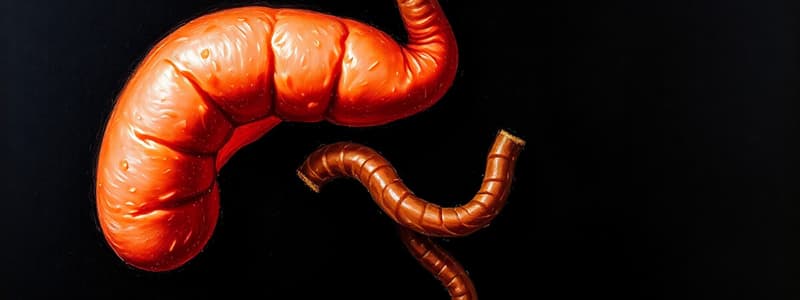Podcast
Questions and Answers
What is the main role of insulin in the body?
What is the main role of insulin in the body?
- It regulates the production of glucagon.
- It assists in the absorption of glucose into cells. (correct)
- It helps transport oxygen in the blood.
- It breaks down starches into carbohydrates.
Which of the following describes diabetes mellitus?
Which of the following describes diabetes mellitus?
- A condition with excess insulin production.
- A metabolic disorder where glucose is completely absent.
- A disorder characterized by high blood sugar due to insufficient insulin. (correct)
- An issue resulting from low levels of glucagon.
What happens to glucose levels in the blood when insulin is insufficient?
What happens to glucose levels in the blood when insulin is insufficient?
- Blood glucose levels rise dramatically. (correct)
- Glucose is fully absorbed by the cells.
- Blood glucose levels remain stable.
- Blood glucose levels drop significantly.
What symptom is associated with the excretion of glucose in urine?
What symptom is associated with the excretion of glucose in urine?
What does glucagon do in the body?
What does glucagon do in the body?
What is the typical blood sugar range for a healthy individual before a meal?
What is the typical blood sugar range for a healthy individual before a meal?
Which consequence can occur due to excess glucose in the blood?
Which consequence can occur due to excess glucose in the blood?
How does insulin interact with glucose at the cellular level?
How does insulin interact with glucose at the cellular level?
What does the term 'diabetes mellitus' literally mean?
What does the term 'diabetes mellitus' literally mean?
Which characteristic symptom includes increased thirst?
Which characteristic symptom includes increased thirst?
What is the primary problem in Type 1 diabetes mellitus?
What is the primary problem in Type 1 diabetes mellitus?
Which form of diabetes is directly associated with pregnancy?
Which form of diabetes is directly associated with pregnancy?
What nickname is commonly used for Type 1 diabetes mellitus?
What nickname is commonly used for Type 1 diabetes mellitus?
How is Type 2 diabetes mellitus typically managed?
How is Type 2 diabetes mellitus typically managed?
What leads to the destruction of insulin-producing cells in Type 1 diabetes?
What leads to the destruction of insulin-producing cells in Type 1 diabetes?
Study Notes
The Pancreas and Blood Sugar Regulation
- The pancreas releases insulin and glucagon to regulate blood glucose levels.
- Insulin helps glucose enter cells, while glucagon stimulates the release of glucose from stores.
Blood Sugar: The Body's Energy Source
- Carbohydrates are broken down into simple sugars, absorbed into the bloodstream as blood glucose, and transported to cells for energy.
- Insulin acts as a "key," allowing glucose to enter cells.
- Without insulin, glucose cannot enter cells, leading to high blood sugar levels.
Diabetes Mellitus: A Group of Metabolic Disorders
- Diabetes mellitus is characterized by either insufficient insulin production or cell resistance to insulin, resulting in high blood sugar.
- Classic symptoms include polyuria (increased urination), polydipsia (increased thirst), and polyphagia (increased hunger).
- Polyuria occurs because excess glucose is excreted in urine, drawing water out of the body.
Type 1 Diabetes Mellitus: Insulin Deficiency
- Type 1 diabetes results from the pancreas's inability to produce insulin due to the destruction of beta cells by an autoimmune response.
- Individuals with type 1 diabetes require insulin injections or an insulin pump for survival.
- It is often referred to as insulin-dependent diabetes or juvenile diabetes.
Type 2 Diabetes Mellitus: Insulin Resistance
- Type 2 diabetes is the most common form and occurs when body cells become resistant to insulin.
- This resistance can be associated with obesity and poor lifestyle habits.
- It is often referred to as non-insulin dependent diabetes or adult-onset diabetes.
- Often managed through dietary changes, exercise, and sometimes oral medication.
Gestational Diabetes: A Temporary Condition
- Gestational diabetes occurs only during pregnancy, likely due to hormonal changes.
- It typically shows no noticeable symptoms and is detected through routine screening.
- Untreated gestational diabetes can increase the risk of developing type 2 diabetes after the birth.
Studying That Suits You
Use AI to generate personalized quizzes and flashcards to suit your learning preferences.
Description
Explore the vital role of the pancreas in blood sugar regulation and the nuances of diabetes mellitus. This quiz covers the functions of insulin and glucagon, the metabolism of carbohydrates, and the symptoms of diabetes. Test your knowledge on how these processes affect overall health.




